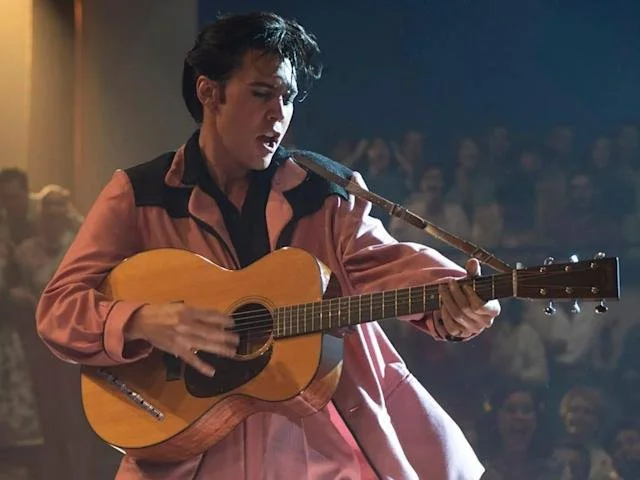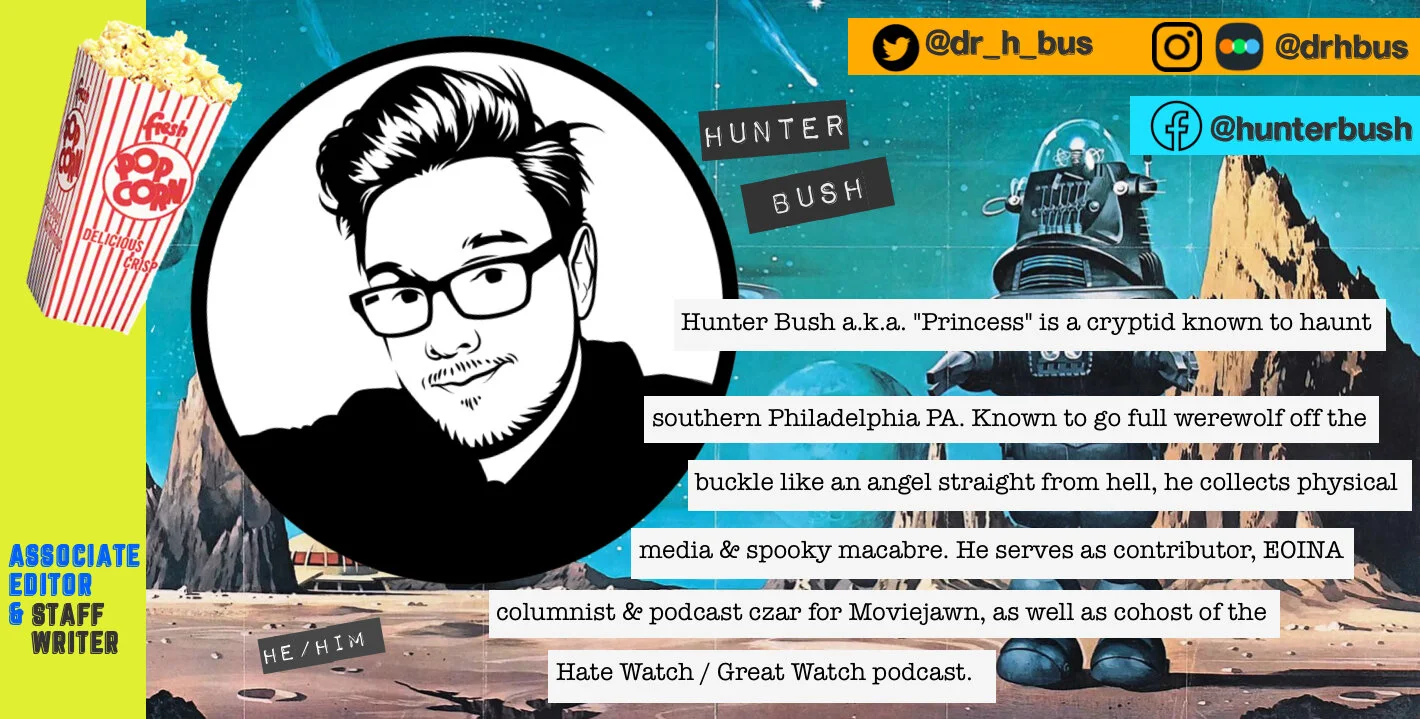Baz Lurhmann's ELVIS embraces the excesses of its subject
Directed by Baz Luhrmann
Written by Baz Luhrmann, Sam Bromell, Craig Pearce, and Jeremy Doner
Starring Austin Butler, Tom Hanks, Olivia DeJonge
Running time: 2 hours, 39 minutes
Rated PG-13 for drugs, language, “suggestive material” and smoking
In theaters June 24
by Hunter Bush, Staff Writer
I don’t mean to brag, but I feel I’m uniquely qualified to be the one who reviews Baz Luhrmann’s Elvis Presley biopic simply titled with the mononym of the King of Rock and Roll. It’s not because I was raised in part by a father who loved Elvis, which can’t be THAT unique an experience. Nor is it because I have found myself becoming MovieJawn’s defacto ‘Elvis Guy’. Is it perhaps because on the Hate Watch/Great Watch podcast - which I cohost with fellow Jawnie Allison Yakulis - we’ve covered ALL of Baz Luhrmann’s previous films? No; not entirely, though that DOES help. I, dear reader, am uniquely qualified to review this film because, some time in the mid-2000s, I spoke to Elvis Presley on the telephone.
But I’ll get to that later.
Baz Luhrmann is a tough director to pin down. He has no specific hard and fast style, instead having some themes and directorial and storytelling “tricks” that he has refined over the course of his career. He celebrates theatricality and performance, has a flair (no pun intended) for visual excess, and he loves love. He handles big emotions better than big set pieces, and better than many directors of his tier. When you lay it all out like that, his tackling Elvis on the big screen makes all the sense in the world.
Elvis Presley made his first records at the age of 18 and passed away at only 43, and for the vast majority of his adult life was one of, if not THE biggest musical entertainer of all time. He was targeted by segregationist and/or prudish politicians, and taken advantage of by his manager Col. Tom Parker (ne Andreas Cornelis van Kuijk) a carnival huckster and lifelong conman, and it’s Parker (played by Tom Hanks) who is the prism through which Luhrmann chooses to view Elvis’ life.
The first five minutes of Elvis is …A LOT. Colonel Tom Parker is at the end of his life and reminiscing, which itself is an interesting inversion of the traditional biopic structure, succinctly parodied in Walk Hard with the line “Dewey Cox needs to think about his whole life before he goes onstage”. But it’s this near-death experience where Luhrmann unleashes his love of visual excess with both barrels. Tom Hanks is in, I kid you not, Goldmember-caliber old man makeup, scampering through an abandoned casino, surrounded by flashing lights and haunted by spinning roulette wheels while the camera shoots impossibly around neon Las Vegas signage. This is what the average filmgoer thinks of as Baz Luhrmann’s style, and while these moments are relatively rare, and well spaced across the nearly 3 hour runtime, they are excessive. But if you can’t handle excess, I can’t imagine what you’d be doing at a biopic about Elvis Presley.
Baz Luhrmann’s bag of tricks are used better here in Elvis than maybe anywhere else in his oeuvre. The film of his that this feels most like is his last, The Great Gatsby (2013). The similarities are there: the story of a larger-than-life man (fictional in Gatsby’s case) told from the perspective of a trusted outsider, both films are unafraid to take big swings tonally and both have well-chosen moments where Luhrmann will visually let the tiger off the leash. Both films approach music in similar ways as well, mashing up era-appropriate tunes with modern samples and motifs, but in Elvis’ case the music almost never stops. It’s a brilliant choice for a movie attempting to cover as much ground as Elvis is because in lieu of stopping dead in its tracks to deliver Elvis songs (which are a must), Luhrmann turns most of the music performances into montages set to whichever song(s) are being performed, allowing him to appease the audience’s sonic expectations while also propelling the story forward.
Austin Butler is a very good Elvis. His physicality is impeccable, his vocal impression is top tier and, mayhap most shocking to general moviegoers - he’s quite a solid actor! He holds his own against Tom Hanks, whose makeup-aided transformation is not always quite as bad/jarring as during the film’s opening, who is delivering a solid and surprisingly nuanced and empathetic performance. It is abundantly clear that Col. Tom Parker, the self-described “Snowman” (where “snow” means “cash”), is manipulating Elvis and his family and that he knows he is, but Hanks makes it obvious that the Colonel doesn’t view himself as a villain so much as a parasite. He’s getting something more from his partnership/stewardship/friendship with Elvis than Elvis is aware of, but he’s also facilitating Elvis’ fortune. In his eyes it’s a mutually beneficial relationship. This, I feel, is the famously villain-shy Hanks’ entrypoint into the character: he may be bad, but he doesn’t really know it.
Neither of these are my favorite performances though. That completely worthless praise (cuz who do I think I am?) goes to Olivia DeJonge as Priscilla Presley. In any of the handful of scenes she’s in, she absolutely delivers, telling you more about her character than twice as much exposition could have. In her first scene we instantly understand how she, among all the girls Elvis has encountered, captured his attention; she’s quick and assertive and she likes him without seeming starstruck. You see in her interactions with Butler how much they mean to each other and, eventually, how hard the King’s unraveling hurts her and in turn how much the loss of her takes its toll on him. Somehow this performance, the smallest of the three leads, is the one I would earmark for an Auspicious Award™ (if Auspicious Awards™ weren’t a bunch of hogwash - Sidebar: Should MovieJawn have our own, unconditionally non-hogwash awards? Would y’all wanna watch that? Sound off below!).
Beyond delivering a visually engrossing - at times overstimulating - film that absolutely delivers a fresh and modern-feeling take on a familiarly iconic story, Baz Luhrmann uses Elvis’ life to examine race in America and the ways in which politicians manipulate tensions to suit their ends. Elvis is just the spoonful of sugar that he’s using to help make this particular lesson easier to swallow. Elvis, like all biopics I’d wager, is hyperbolic at times but Luhrmann is only getting better and more refined as a director with each film. After making Strictly Ballroom (1992), he’d become known in America with Romeo + Juliet (1996) followed by Moulin Rouge! (2001), both stylistically excessive. In 2008 he’d attempted to curtail those tendencies with the somewhat unbalanced Australia before making the aforementioned Great Gatsby in 2013. Gatsby felt like an evolution in Luhrmann’s style, the at the time best-yet marrying of subject and sensibility. Until now. After seeing Elvis I’m at a loss to imagine what he could tackle next that would feel more of a perfect match for his signature flair. Elvis is a high water mark in a storied career that I cannot wait to see continue. See it safely at your earliest convenience.
The Time I Spoke to Elvis:
Yeah baby. I once, oh so briefly, worked as a telemarketer (until the establishment burned down on Christmas Eve, but that’s another story entirely) and, anyway: I spoke to Elvis. I didn’t know it was Elvis when I dialed the number of course. When you work a job like that, you just get a list of phone numbers to call and a script for whatever you’re selling or asking. In my case, we were polling people on detergent brands. So anyhoo, one day I’m making my calls and eventually someone picks up and boy howdy does this dude sound exactly like Elvis, even just from however he answered the phone. But the way these telemarketing gigs work, you can’t stop once you have even the slightest bit of momentum. You get, essentially “points” for each segment of a call you get through. There’s the initial “Hello (sir/madam) my name is (your name) and I am calling from (company)” block, then you give them the pitch of the call. In this case, we were reading off pairs of detergent brand names and asking the subject to pick one from each pair. If they don’t hang up, then you have to actually do it and it’s quite long, frustratingly long many would say. Then if you make it through the whole shebang and they’re still on the line, you’ve gotta ask them for their information - which, and I cannot state clearly enough that I DO NOT KNOW what they did with that information (above my pay grade) - and if you can get ‘em to give you a name, location and age you (or in this case me) get extra “points” which can mean a bigger paycheck.
So. I get through the first bit of my spiel, and I lay out the pairs of brand names conceit. He agrees and off we go. Due to the nature of the quiz, most of this man’s answers are monosyllabic because most laundry detergents are: All! Biz! Gain! etc., but I’m still thinking “This mf’er sounds like Elvis!”. About ⅔ of the way through the quiz, he stops me and says “Hey kid, is this gonna be much longer? I’m about to make dinner.” and after that comparative soliloquy, I am 100% certain beyond a shadow of a doubt that I’m talking to the King. I give him a “I’ll go as fast as I can sir. It’d really mean a lot if you could just finish this with me.” He agrees and I continue. He starts just saying “First one” over and over and sounding a little more frustrated each time. So I’m trying to figure out: how can I get him to show his hand? How can I let him know that I know? Before I know it, we’re done with the quiz and now I have to ask him for his personal information. I explain that this is the last bit and that he can give me initials or whatever he wants, but it looks a lot better for me if he’d answer. He sighs, but agrees and on instinct alone I skip the name part. His location he says is Tennessee (later I check the area code and that tracks), he says his age is 69 (nice) and when I ask him for his name or initials he pauses, then says “L.V.” (eL Vis)! I am, as the kids say these days, shook but this is my moment. There’s silence for a few seconds before I regain my composure and tell him “I appreciate your time sir.” and then I drop the hammer: “You’re the King.” and when I tell you that the line was so silent that I could hear the old fashioned rotating fan he had on in the background before he finally responds. And I’m sure you know what he said.
“Thank you. Thank you very much.”
Lovin’ with Luhrmann
The Hate Watch/Great Watch podcast examines the films of Baz Luhrmann:




